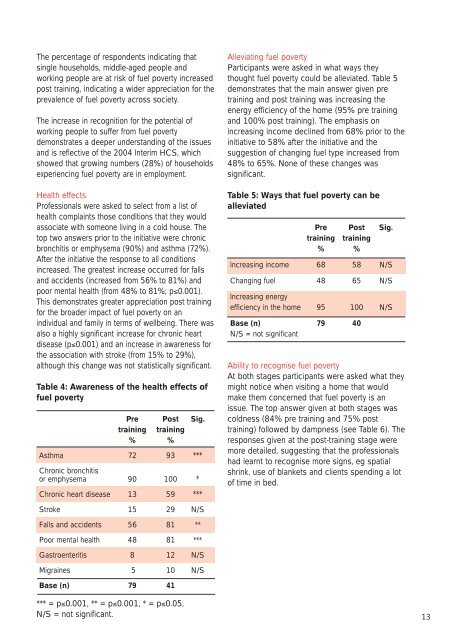Increasing fuel poverty awareness - Health Promotion Agency
Increasing fuel poverty awareness - Health Promotion Agency
Increasing fuel poverty awareness - Health Promotion Agency
You also want an ePaper? Increase the reach of your titles
YUMPU automatically turns print PDFs into web optimized ePapers that Google loves.
The percentage of respondents indicating that<br />
single households, middle-aged people and<br />
working people are at risk of <strong>fuel</strong> <strong>poverty</strong> increased<br />
post training, indicating a wider appreciation for the<br />
prevalence of <strong>fuel</strong> <strong>poverty</strong> across society.<br />
The increase in recognition for the potential of<br />
working people to suffer from <strong>fuel</strong> <strong>poverty</strong><br />
demonstrates a deeper understanding of the issues<br />
and is reflective of the 2004 Interim HCS, which<br />
showed that growing numbers (28%) of households<br />
experiencing <strong>fuel</strong> <strong>poverty</strong> are in employment.<br />
<strong>Health</strong> effects<br />
Professionals were asked to select from a list of<br />
health complaints those conditions that they would<br />
associate with someone living in a cold house. The<br />
top two answers prior to the initiative were chronic<br />
bronchitis or emphysema (90%) and asthma (72%).<br />
After the initiative the response to all conditions<br />
increased. The greatest increase occurred for falls<br />
and accidents (increased from 56% to 81%) and<br />
poor mental health (from 48% to 81%; p≤0.001).<br />
This demonstrates greater appreciation post training<br />
for the broader impact of <strong>fuel</strong> <strong>poverty</strong> on an<br />
individual and family in terms of wellbeing. There was<br />
also a highly significant increase for chronic heart<br />
disease (p≤0.001) and an increase in <strong>awareness</strong> for<br />
the association with stroke (from 15% to 29%),<br />
although this change was not statistically significant.<br />
Table 4: Awareness of the health effects of<br />
<strong>fuel</strong> <strong>poverty</strong><br />
Pre Post Sig.<br />
training training<br />
% %<br />
Asthma 72 93 ***<br />
Chronic bronchitis<br />
or emphysema 90 100 *<br />
Chronic heart disease 13 59 ***<br />
Alleviating <strong>fuel</strong> <strong>poverty</strong><br />
Participants were asked in what ways they<br />
thought <strong>fuel</strong> <strong>poverty</strong> could be alleviated. Table 5<br />
demonstrates that the main answer given pre<br />
training and post training was increasing the<br />
energy efficiency of the home (95% pre training<br />
and 100% post training). The emphasis on<br />
increasing income declined from 68% prior to the<br />
initiative to 58% after the initiative and the<br />
suggestion of changing <strong>fuel</strong> type increased from<br />
48% to 65%. None of these changes was<br />
significant.<br />
Table 5: Ways that <strong>fuel</strong> <strong>poverty</strong> can be<br />
alleviated<br />
Pre Post Sig.<br />
training training<br />
% %<br />
<strong>Increasing</strong> income 68 58 N/S<br />
Changing <strong>fuel</strong> 48 65 N/S<br />
<strong>Increasing</strong> energy<br />
efficiency in the home 95 100 N/S<br />
Base (n) 79 40<br />
N/S = not significant<br />
Ability to recognise <strong>fuel</strong> <strong>poverty</strong><br />
At both stages participants were asked what they<br />
might notice when visiting a home that would<br />
make them concerned that <strong>fuel</strong> <strong>poverty</strong> is an<br />
issue. The top answer given at both stages was<br />
coldness (84% pre training and 75% post<br />
training) followed by dampness (see Table 6). The<br />
responses given at the post-training stage were<br />
more detailed, suggesting that the professionals<br />
had learnt to recognise more signs, eg spatial<br />
shrink, use of blankets and clients spending a lot<br />
of time in bed.<br />
Stroke 15 29 N/S<br />
Falls and accidents 56 81 **<br />
Poor mental health 48 81 ***<br />
Gastroenteritis 8 12 N/S<br />
Migraines 5 10 N/S<br />
Base (n) 79 41<br />
*** = p≤0.001, ** = p≤0.001, * = p≤0.05,<br />
N/S = not significant.<br />
13
















